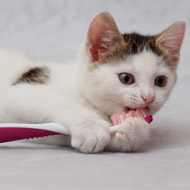Pet owners urged to brush up on dental health

Just one in every 50 cat owners are brushing their pet's teeth as frequently as vets advise.
Cat and dog owners are not brushing their pets' teeth as frequently as vets recommend, according to new research.
Figures released by Tesco Bank Pet Insurance reveal that just one in every 16 dog owners and one in every 50 cat owners are brushing their pet's teeth as frequently as vets advise.
The research also shows that almost half of all dogs and eight out of 10 cats have never had their teeth brushed at all.
Not realising that they need to brush their pet's teeth is one of the most common reasons why owners are put off.
A further third said that their pets don't like having it done, and more than half felt that a dental chew toy or chew treat was an adequate replacement for brushing.
Bad breath is also a concern, with more than a third of pet owners saying that it is quite normal in dogs and cats, when in fact it can be an early sign of gum disease.
TV vet Marc Abraham, said; “Poor dental health is unfortunately one of the biggest ‘silent’ problems we see as a vet. Your cat or dog can’t tell you that their mouth is sore or that their teeth are hurting, and the only real way to safeguard against it is very regular brushing.
"Four out of every five cats and dogs over the age of three suffers from gum disease which, when left untreated, can lead to serious health problems in later life. If you can manage it, daily brushing is recommended, the same as with your own teeth, and with a bit of practice, you can effectively clean your pet’s teeth in a matter of minutes.”
For pet owners worries about how to get into a good dental routine with their pet, Marc Abraham has teamed up with Tesco to provide owners with advice on getting started. A short video can be found at https://www.youtube.com/watch?v=I6AbNGbU4Oc



 The Veterinary Medicines Directorate (VMD) is inviting applications from veterinary students to attend a one-week extramural studies (EMS) placement in July 2026.
The Veterinary Medicines Directorate (VMD) is inviting applications from veterinary students to attend a one-week extramural studies (EMS) placement in July 2026.